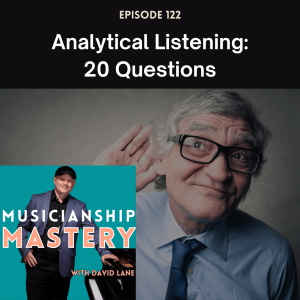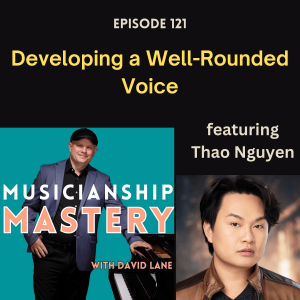Musicianship Mastery with David Lane
Do you want to be a great musician? A well-rounded musician? Maybe you’re already a good musician, and you want to take that next step. To do that, you need to be able to sight-read well, play by ear, compose or improvise, understand the art of practice, and be versatile in many other ways. Musicianship Mastery (formerly known as The Musician Toolkit) explores these tools, how to improve them, and how you can apply them to a variety of gigs and musical careers whether you’re a professional musician or a committed artist who makes your income outside of music. Join us on a quest to improve your musicianship and to make you the most well-rounded musician you can be!
Episodes

Monday Sep 08, 2025
Monday Sep 08, 2025
Composing music is something that you can practice and improve in the same way you can with your instrument. In this episode, Dr. Tony Steve and I chat about music composition as a craft, the idea of compositional templates, the importance of limitations, mastering idioms, counterpoint, and how you can use exercises to improve.
Follow Tony at https://www.facebook.com/tonystevepercussionist
Musicianship Mastery is formerly known as The Musician Toolkit.
Let me know your thoughts on this episode as a voice message to possibly share on a future episode at https://www.speakpipe.com/MusicianToolkit
If you enjoyed this, please give it a rating and review on the podcast app of your choice. You can find all episodes of this podcast at https://www.davidlanemusic.com/toolkit
You can follow David Lane AND the Musician Toolkit podcast on Facebook @DavidMLaneMusic, on Instagram and TikTok @DavidLaneMusic, and on YouTube @davidlanemusic1

Monday Sep 01, 2025
Monday Sep 01, 2025
Good practice isn't aimless, but involves a plan. This episode talks about how you can analyze your music before you begin practicing so that you can be most efficient in your learning.
Musicianship Mastery is formerly known as The Musician Toolkit.
Let me know your thoughts on this episode as a voice message to possibly share on a future episode at https://www.speakpipe.com/MusicianToolkit
If you enjoyed this, please give it a rating and review on the podcast app of your choice. You can find all episodes of this podcast at https://www.davidlanemusic.com/toolkit
You can follow David Lane AND the Musician Toolkit podcast on Facebook @DavidMLaneMusic, on Instagram and TikTok @DavidLaneMusic, and on YouTube @davidlanemusic1

Monday Aug 25, 2025
Monday Aug 25, 2025
We've recently discussed the importance of quarterly goals, but are those goals feeding into a longer term vision? How do you see yourself as a musician in 5 years, and how do you get there from here? This episode offers some prompts to help build your long term musical goals, and how this connects to your shorter term goals.
Episode mentioned: https://www.davidlanemusic.com/toolkit/episode/7300027b/what-i-got-wrong-about-quarterly-goals
Musicianship Mastery is formerly known as The Musician Toolkit.
Let me know your thoughts on this episode as a voice message to possibly share on a future episode at https://www.speakpipe.com/MusicianToolkit
If you enjoyed this, please give it a rating and review on the podcast app of your choice. You can find all episodes of this podcast at https://www.davidlanemusic.com/toolkit
You can follow David Lane AND the Musician Toolkit podcast on Facebook @DavidMLaneMusic, on Instagram and TikTok @DavidLaneMusic, and on YouTube @davidlanemusic1

Monday Aug 18, 2025
Monday Aug 18, 2025
For more than 30 years, Doug Minerd has found a place to use and further develop his skills in composing and arranging, lead rehearsals, and unlike a lot of similar musicians...engage with a wide variety of people in collaboration. He's done this while working up to the executive office at places like Cedar Point, Busch Gardens, Sesame Place, and Sea World. He also has had his compositions performed in Dollywood, Silver Dollar City, Hersey Park, Princess Cruise Lines, and more. He shares both the musical tools and the attitude that led to such a successful career.
Find out more about Doug and listen to his music at: https://www.minerdmusicworks.com/
Musicianship Mastery is formerly known as The Musician Toolkit.
Let me know your thoughts on this episode as a voice message to possibly share on a future episode at https://www.speakpipe.com/MusicianToolkit
If you enjoyed this, please give it a rating and review on the podcast app of your choice. You can find all episodes of this podcast at https://www.davidlanemusic.com/toolkit
You can follow David Lane AND the Musician Toolkit podcast on Facebook @DavidMLaneMusic, on Instagram and TikTok @DavidLaneMusic, and on YouTube @davidlanemusic1

Monday Aug 11, 2025
Monday Aug 11, 2025
As one of many thousands of users of Finale, I was floored by the news last year that they were no longer continuing their legendary notation software. I've chosen to begin learning Dorico. It's slow going, but I wanted to share my experiences so far as a beginner, and what I'd recommend to get the most out of the program.
Also check out the previous episode on music notation programs: Music Notation Apps in a Post-Finale World (with Jason Loffredo)
Musicianship Mastery is formerly known as The Musician Toolkit.
Let me know your thoughts on this episode as a voice message to possibly share on a future episode at https://www.speakpipe.com/MusicianToolkit
If you enjoyed this, please give it a rating and review on the podcast app of your choice. You can find all episodes of this podcast at https://www.davidlanemusic.com/toolkit
You can follow David Lane AND the Musician Toolkit podcast on Facebook @DavidMLaneMusic, on Instagram and TikTok @DavidLaneMusic, and on YouTube @davidlanemusic1

Monday Aug 04, 2025
Monday Aug 04, 2025
After nearly a year, this podcast returns to the four core performance skills. These are the skills that will equip you as a performer for absolutely any situation. This episode shares how you can combine 2 or 3 at once into your practice time.
If you missed it, check out the previous episodes in this series:
The Four Core Skills Part 1: An Overview of the Skills
The Four Core Skills Part 2: Sight Reading
The Four Core Skills Part 3: Playing by Ear
The Four Core Skills Part 4: Transposing
The Four Core Skills, Part 5: Improvisation
Four Core Skills for Beginning Students
Musicianship Mastery is formerly known as The Musician Toolkit.
Let me know your thoughts on this episode as a voice message to possibly share on a future episode at https://www.speakpipe.com/MusicianToolkit
If you enjoyed this, please give it a rating and review on the podcast app of your choice. You can find all episodes of this podcast at https://www.davidlanemusic.com/toolkit
You can follow David Lane AND the Musician Toolkit podcast on Facebook @DavidMLaneMusic, on Instagram and TikTok @DavidLaneMusic, and on YouTube @davidlanemusic1

Monday Jul 28, 2025
Monday Jul 28, 2025
Whether you find the thought of playing in front of people to be paralyzing or if you just get nervous when someone else is listening and don't play as well as you think you should, this episode is for you! Dr. Michelle Wachter, a piano teacher and executive director of the Flagstaff Symphony Orchestra, shares her 3 stage strategy for how to understand your natural performance energy and turn it into an advantage!
Musicianship Mastery is formerly known as The Musician Toolkit.
Let me know your thoughts on this episode as a voice message to possibly share on a future episode at https://www.speakpipe.com/MusicianToolkit
If you enjoyed this, please give it a rating and review on the podcast app of your choice. You can find all episodes of this podcast at https://www.davidlanemusic.com/toolkit
You can follow David Lane AND the Musician Toolkit podcast on Facebook @DavidMLaneMusic, on Instagram and TikTok @DavidLaneMusic, and on YouTube @davidlanemusic1

Monday Jul 21, 2025
Monday Jul 21, 2025
If you're studying music and feeling discouraged, this episode is for you! Here are 10 encouragements to help you accept where you are and keep going in your own way as a musician.
Musicianship Mastery is formerly known as The Musician Toolkit.
Let me know your thoughts on this episode as a voice message to possibly share on a future episode at https://www.speakpipe.com/MusicianToolkit
If you enjoyed this, please give it a rating and review on the podcast app of your choice. You can find all episodes of this podcast at https://www.davidlanemusic.com/toolkit
You can follow David Lane AND the Musician Toolkit podcast on Facebook @DavidMLaneMusic, on Instagram and TikTok @DavidLaneMusic, and on YouTube @davidlanemusic1

Monday Jul 14, 2025
Monday Jul 14, 2025
The ability to listen to music well, analytically, is a crucial skill for any good musician to develop. Analytical listening is quite a bit different than just putting on music in the background. One of the keys to success is simply asking the right questions and taking note of the answers. Here are 20 questions to can ask while listening to a piece of music to help you get the most out of it!
Musicianship Mastery is formerly known as The Musician Toolkit.
Let me know your thoughts on this episode as a voice message to possibly share on a future episode at https://www.speakpipe.com/MusicianToolkit
If you enjoyed this, please give it a rating and review on the podcast app of your choice. You can find all episodes of this podcast at https://www.davidlanemusic.com/toolkit
You can follow David Lane AND the Musician Toolkit podcast on Facebook @DavidMLaneMusic, on Instagram and TikTok @DavidLaneMusic, and on YouTube @davidlanemusic1

Monday Jul 07, 2025
Monday Jul 07, 2025
Being comfortable with singing is a tool that every musician should have, even instrumentalists. It's also worth exploring all the things the voice can do to come up with your own personal sound that doesn't necessarily have to blend with everyone else. Thao Nguyen, voice teacher and actor, helps us understand how to explore this instrument you carry around with you as well as things to maintain vocal health.
Follow Thao at https://www.thaotnguyen.com/
Musicianship Mastery is formerly known as The Musician Toolkit.
Let me know your thoughts on this episode as a voice message to possibly share on a future episode at https://www.speakpipe.com/MusicianToolkit
If you enjoyed this, please give it a rating and review on the podcast app of your choice. You can find all episodes of this podcast at https://www.davidlanemusic.com/toolkit
You can follow David Lane AND the Musician Toolkit podcast on Facebook @DavidMLaneMusic, on Instagram and TikTok @DavidLaneMusic, and on YouTube @davidlanemusic1

Thank you for listening!
If you would like to help financially support this podcast, we gratefully accept donations of any amount through this link.
Your donation can be one-time or renew monthly. Thanks so much for your support!
You can also leave a voice message for possible inclusion on an episode at https://www.speakpipe.com/MusicianToolkit . Please leave at least your first name and what your message is regarding. Also feel free to say something about yourself if you're a musician and/or a teacher.









